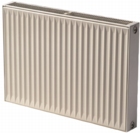Space heating with low flow temperatures

Radiators can still be part of space-heating solutions based on low flow temperatures — provided they are designed for the purpose.
David Hearne reflects on the demands placed on wet space-heating systems by the trend towards lower flow temperatures — and how radiators can still feature in such systems.With the rise in popularity of condensing boilers you could be forgiven for thinking that the days of the traditional radiator were numbered. However, technology is moving on, and there are now radiators in the market place that are capable of emitting significant levels of heat from even the lowest flow temperatures, characteristic of condensing boilers. To best explain the options available and how to choose the most appropriate system, I recommend beginning by looking at what it is you want to achieve through space heating.
Demands The British climate is very unpredictable, which means that our heating solutions need to be incredibly flexible. Essentially, we want to be in a cool building on a hot summer day and in a warm building in the middle of winter — and be satisfied for all the variables in between. Equally, there may be some areas inside a building which need to be kept at a different temperature to others, or which may have a lower demand on a heating system either through their level of usage or through the size of the floor space. Further demands come from pressures to save energy and money — making the task of choosing the right system really quite complex. Starting at the heat source, in recent years condensing boilers have risen in popularity — pretty much as a result of their energy efficiency. They lend themselves particularly well to installation with underfloor heating systems, given their lower flow and return temperature relative to that of traditional boiler systems. Radiators on the other hand have a different sort of appeal. They are a space-heating solution first and foremost, but they can also complement the architectural design of a building and hold a certain level of attraction — people are naturally drawn to radiators as they provide a visual feeling of warmth. Traditional radiators are not really suitable for use with condensing boilers as they would need to be of considerable size to generate the required heat output. However, working with BSS Industrial, we have recently launched the BOSS Riopanel radiator. The range is manufactured in Denmark by Riopanel, which we acquired two years ago, and includes type 33 radiators constructed with three panels and three convectors which offer significant heat output at even the lowest flow temperatures.
Refurbishment We have recently installed 600 such radiators as part of an office refurbishment project for Norwich Union. Condensing boilers had been specified for the building, based on energy consumption and life-cycle costing, so the radiators needed to be of a design which would not only work with low flow temperatures but also fit in to the recesses between concrete pillars which provide structural support for the building. Essentially, we were able to make bespoke triple-panel radiators (type 33) to a specific length. This specification meant the radiators gave the desired heat output and maximised the use of space. Refurbishment projects will often mean that specifications are quite restrictive. The most intelligent heating systems, however, are those that combine a number of solutions to offer maximum flexibility for facilities management and are bespoke to the needs of a particular building. For example, underfloor heating can be suitable for heating large areas but is particularly slow to react to changes in demand, something which is only amplified when working with vast floor spaces. Radiator output, however, can be used to rapidly heat an area on demand and offer flexibility of control whilst underfloor heating provides constant background heat. This consideration of controllability is not something to be taken lightly. BSS Industrial launched a range of thermostatic radiator valves earlier this year based on response to customer demand for greater controllability — both in terms of space heating and energy consumption. The range includes everything from thermal heads to manual radiator valves, all compliant to EN215.
Market The heating market is growing and shaping itself — responding to demands for controllability, energy efficiency, price and design. In the current market, I believe there is room for a variety of heating solutions to work in harmony with one another and there will be many cases where one option may be far more suitable than another. However, as we have proved with the BOSS Riopanel, it is important for specifiers and contractors to keep up to date with advances in technology and design to ensure they are able to choose the most suitable heating solution for their building.
David Hearne is general manager with Hudevad.
Related links:


